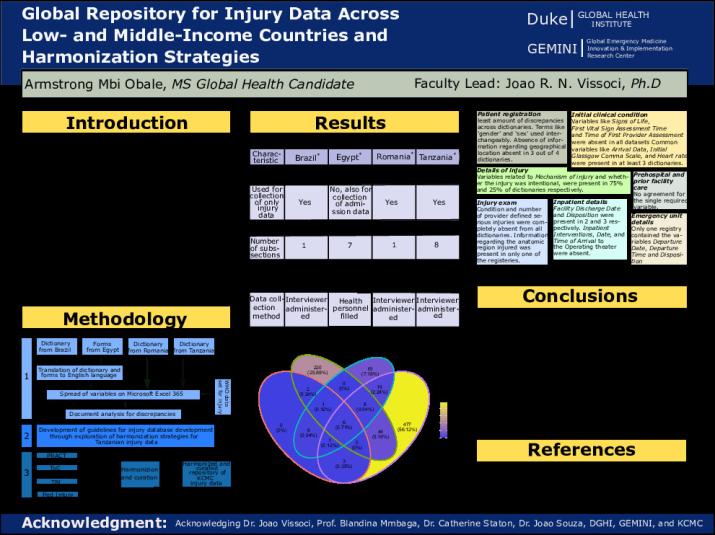Global Repository for Injury Data Across Low- and Middle-Income Countries and Harmonization Strategies

Global Repository for Injury Data Across Low- and Middle-Income Countries and Harmonization Strategies
Project overview
When it comes to accessibility and utilization of data management systems, low- and middle-income countries (LMICs) still face major challenges. AS a means of leveraging data management sustems, we seek to setup a Global Repository for Injury Data (GRID) for LMICs, which will be developed and implemented using the Findable, Accessible, Interoperable, Reusable (FAIR) data principle. The initial phase will consist of standardization, aggregation, and documentation of data from four participating sites in four different LMICs; Brazil, Egypt, Romania, and Tanzania.
We specifically aim to study the disparities in variables that currently exist across injury data dictionaries/data collection form from four sites located in Brazil, Egypt, Romania, and Tanzania, evaluate them in terms of the minimum WHO requirements for injury data dictionaries, and investigate harmonization strategies. We are conducting a FAIRness assessment of the current injury data dictionaries/data collection form and bringing out discrepancies. We will then investigate harmonization options for Tanzanian injury data and produce guidelines for injury data base development in LMICs. Following the guidelines, we will set up a harmonized and curated repository of inury data from Kilimanjaro Christian Medical Center (KCMC).
Given that injuries continue to attract glogal attention by causing huge disability-adjusted life years (DALYS) in LMICs, establishing the GRID from LMICs will be a major step toward understanding injuries in LMICs. The data will enable research that will result in knowledge that if well applied, could mitigate the burden of injuries in LMICs.
Project notes
Project is in progress.
Last updated on October 3, 2022
